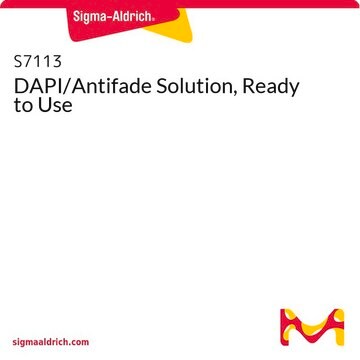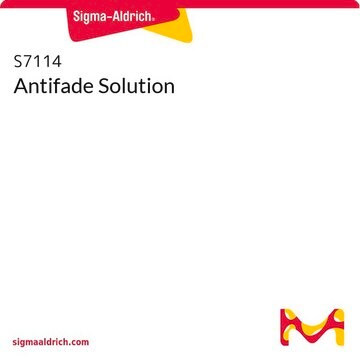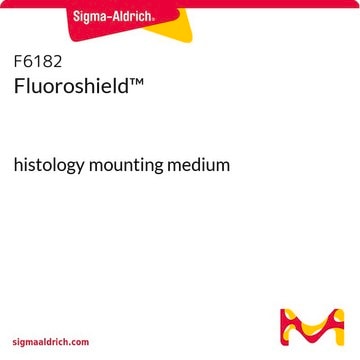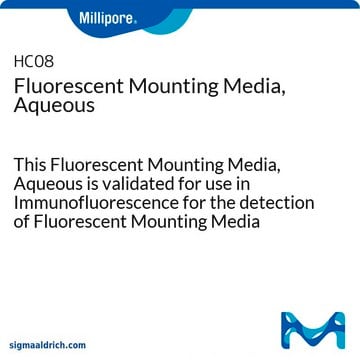MBD0015
DAPI gebrauchsfertige Lösung
For Nuclear counterstain in immunoflourecence microscopy, High Content Screening (HCS), Chromosome staining and flow cytometry (FACS)., 1 mg/mL
Synonym(e):
4′,6-Diamidin-2-phenylindol -dihydrochlorid, 2-(4-Amidinophenyl)-6-indolcarbamidin -dihydrochlorid, DAPI -dihydrochlorid
About This Item
Empfohlene Produkte
Qualitätsniveau
Form
liquid
Lagerbedingungen
protect from light
Konzentration
1 mg/mL
Methode(n)
transfection: suitable
Löslichkeit
water: soluble
Fluoreszenz
λex 340 nm; λem 488 nm (nur DAPI)
λex 364 nm; λem 454 nm (DAPI-DNA-Komplex)
Eignung
suitable for nucleic acid staining
Versandbedingung
dry ice
Lagertemp.
−20°C
SMILES String
Cl.Cl.NC(=N)c1ccc(cc1)-c2cc3ccc(cc3[nH]2)C(N)=N
InChI
1S/C16H15N5.2ClH/c17-15(18)10-3-1-9(2-4-10)13-7-11-5-6-12(16(19)20)8-14(11)21-13;;/h1-8,21H,(H3,17,18)(H3,19,20);2*1H
InChIKey
FPNZBYLXNYPRLR-UHFFFAOYSA-N
Suchen Sie nach ähnlichen Produkten? Aufrufen Leitfaden zum Produktvergleich
Verwandte Kategorien
Allgemeine Beschreibung
Anwendung
DAPI is several times more sensitive than ethidium bromide for staining DNA in agarose gels. It may be used for photofootprinting of DNA, to detect annealed probes in blotting applications by specifically visualizing the double-stranded complex, and to study the changes in DNA and analyze DNA content during apoptosis using flow cytometry. DAPI staining has also been shown to be a sensitive and specific detection method for mycoplasma.
For Nuclear counterstain in immunoflourecence microscopy, High Content Screening (HCS), Chromosome staining and flow cytometry (FACS).
Biochem./physiol. Wirkung
Leistungsmerkmale und Vorteile
- Ready-to-use liquid, cell permeable dye.
- Can be used with live cells and fixed cells.
- Effective for fixed-cell staining and quantitation of DNA content.
- Optimal Counterstain when using fluorescent antibodies during fluorescence microscopy or high-content screening (HCS) applications.
Physikalische Form
Signalwort
Warning
H-Sätze
Gefahreneinstufungen
Skin Sens. 1
Lagerklassenschlüssel
12 - Non Combustible Liquids
WGK
WGK 1
Flammpunkt (°F)
Not applicable
Flammpunkt (°C)
Not applicable
Analysenzertifikate (COA)
Suchen Sie nach Analysenzertifikate (COA), indem Sie die Lot-/Chargennummer des Produkts eingeben. Lot- und Chargennummern sind auf dem Produktetikett hinter den Wörtern ‘Lot’ oder ‘Batch’ (Lot oder Charge) zu finden.
Besitzen Sie dieses Produkt bereits?
In der Dokumentenbibliothek finden Sie die Dokumentation zu den Produkten, die Sie kürzlich erworben haben.
Kunden haben sich ebenfalls angesehen
Unser Team von Wissenschaftlern verfügt über Erfahrung in allen Forschungsbereichen einschließlich Life Science, Materialwissenschaften, chemischer Synthese, Chromatographie, Analytik und vielen mehr..
Setzen Sie sich mit dem technischen Dienst in Verbindung.












